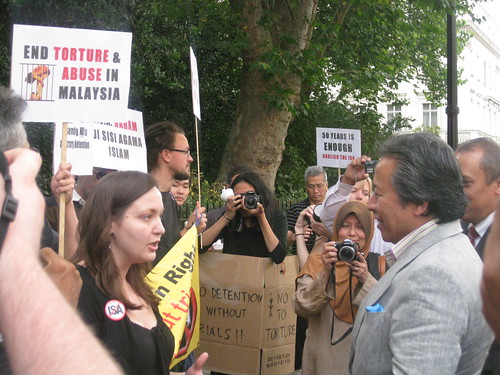-------------------------------------------
By BA Hamzah
THE days of Pax Americana are over. So what if Pax Sinica were to rule the world? At its optimum size, during the Cold War period the US military was designed to fight two and a half conventional wars. Theoretically, it could fight a conventional war in Europe, another one in Asia and half a war in the Middle East and still survive. The US strategy was not put to test, courtesy of the Soviet Union’s break-up.
Today, the US is back in Southeast Asia adding a new operational theatre to Iraq and Afghanistan. The fiasco in Iraq is being repeated in Afghanistan as the US searches for a right balance between counter-insurgency and counter-terrorism strategy.
The cost of waging more than two wars could result in double-dip recession in the US. The WikiLeaks are difficult to plug. Like the Pentagon Papers, the exposure will shift public opinion and could result in President
According to the Economist US military activities in the South China Sea, Yellow Sea and East China Sea are intimidating and more than a show of force and a direct challenge to China.
Suddenly, the South China Sea has become US national interest after close to four decades of absence. It has conducted naval exercises with Vietnam the enemy state it failed to destroy. Recall those days when South Vietnam was of vital interest to America and an unfounded fear of the dominoes falling to communist rule. America’s hasty retreat in April 1975 from the roof-top of its embassy in Saigon did not herald the fall of Thailand, Indonesia, Malaysia and Singapore to the communists.
Communist Vietnam has embraced capitalism and looks like becoming an ally of the US planning to contain China’s military rise. The US is back with a new mantra that China is a threat to the region. Of course, it does not help China’s cause that it has militarised the South China Sea; Beijing has also warned American oil companies from drilling for oil in the disputed area.
Vietnam should carefully note that when elephants make love, the grass will be trampled. History, geography and economics tend to favour China.
The US should heed the advice from Alberto Romulo, the Philippines foreign secretary, who said Asean countries did not need the US to solve their territorial disputes with China which is fuelling the economy of the region. Romulo is right: why should Asean get embroiled in a US-Sino conflict that has been running since the Second World War? Besides, why should Asean countries
Anti-US policy in Japan, South Korea and the China-Taiwan free trade agreement has forced the US to be on the offensive. But to win wars a democracy like the US needs a strong economy. The US Commerce Department revealed that the trade deficit for June 2010 was US$42.7 billion (RM134.4 billion), 19% more than in May, and to add insult to injury it said the US trade
As China becomes the world’s largest economy the deficit with the US is likely to expand.
The US is right to be concerned with the freedom of navigation in the seas near China. But the issue is China has never prevented states from exercising this freedom. Of course, China has contested military activities especially espionage in its exclusive economic zone. Brazil, India, Ecuador, Bangladesh, Egypt and Malaysia are among the states that do not allow foreign countries to conduct military manoeuvres in their exclusive economic zones.
A new battlefront in the Asia-Pacific region may drain more resources that US needs to win wars at home which it must not lose. It was Thucydides, author of the Peloponnesian War, who wrote that it was the blind and immoderate behaviour of the Athenians which ultimately led to their downfall. A lesson in history, perhaps for the US to savour.
BA Hamzah is a student of politics, international law and education. Comments: letters@thesundaily.com
Source: http://www.thesundaily.com/article.cfm?id=51106






